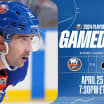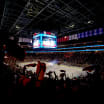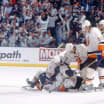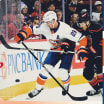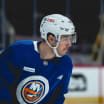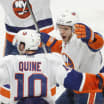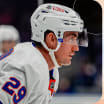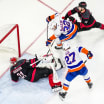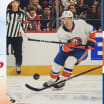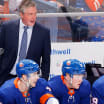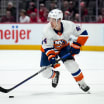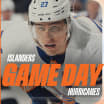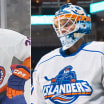For those of us who have followed the Islanders since their inception in 1972 -- and for those who are newer to the club -- I have an interesting game to play with you. And no matter what the result, you'll be the winner. My game is called "Picking the Top Ten Islanders Game Moments." Since The Maven has been there from the start, I can recall significant events that have contributed to the franchise's admirable legacy.
With that in mind, I have selected my personal best ten game moments over the past 46 years. On your side, fellow fan, you can agree or disagree with me but I think you'll be with me when it comes to agreeing that each contest recalled, starting with number ten, is memorable. So, here goes -- YES! YES! YES!
Stan Fischler's Top Ten Isles Game Moments: No. 1
Stan Fischler counts down his top 10 greatest Islanders game moments
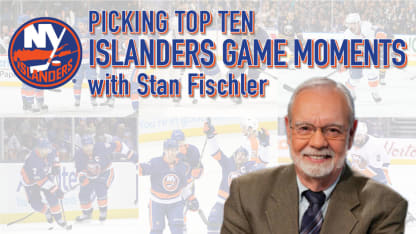
By
Stan Fischler
Special to NHL.com
1. FIRST AND FOREMOST -- THE WORLD PREMIERE AT NASSAU COLISEUM:
The 1972-73 season was an extraordinary one for professional hockey. On the one hand, the National Hockey League was expanding to Long Island and Atlanta, but there was also fresh and heated completion from the brand new World Hockey Association.
Nevertheless, the Islanders new general Manager Bill Torrey was ready for the challenge.
"I knew that we had to take the WHA seriously," said Torrey, "because we were going to have to battle them for players."
At the draft on June 6, 1972, Torrey picked right wing Billy Harris, who had starred with the Junior Toronto Marlboros. Harris would prove to be a matinee idol, but Torrey knew he would need more than that; specifically a veteran to lead the team.
Once again, Bowtie Bill lucked out. He plucked Eddie Westfall, a superb defensive forward who had played for Boston's Stanley Cup winners in 1970 and 1972. Westfall would be named captain and make an immediate impact.
Plus, Eddie quickly became identified not by his name, but by the numeral he wore on his jersey. He was simply called, "18".
Ex-Canadiens and Rangers center Phil Goyette was named coach of the baby Islanders, who opened training camp in 1972 in Peterborough, Ontario. The Islanders played their first exhibition game against the equally new Flames on September 18, 1972. Atlanta won, 4-1. Billy Harris scored the Isles only goal.
On September 27th, the new sextet played its first-ever game at the Coliseum. It was an exhibition affair against the Rangers and a crowd of more than 11,000 watched the Blueshirts defeat their new neighbors, 6-4. Harris starred again for the Nassaumen with two goals.
All of this was a mere prelude for the team's official opening night, October 7, 1972. Suitable to the occasion the debut received sufficient fuss and fanfare among the media and Nassau County politicians; but it didn't sell out.
As the crowd of 12,221 made its way to the seats, NHL President Clarence Campbell viewed the new building from top to bottom, and told reporters, "This is a magnificent place to watch hockey."
At first the crowd appeared to have difficulty to grasp what was and was not important. The first cheer came as Flames coach Bernie (Boom Boom) Geoffrion was introduced. But soon enough the audience took to their new favorites.
The game remained scoreless until Atlanta penalty killer Morris Stefaniw beat Isles puck-stopper Gerry Desjardins at 12:48 of the first period. The Isles finally lit the red light at 19:29 of the middle frame when Westfall delivered the tying counter.
Unfortunately the Flames blew open the game with two goals in the third period by Rey Comeau at 2:12 and Bob Leiter a minute later.
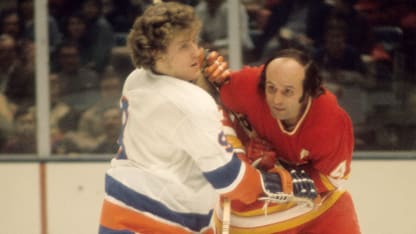
© B Bennett/Getty Images
A late Islanders counterattack produced a goal at 16:51 by Harris to tighten the score, but the Flames held on for a 3-2 victory.
It wasn't the most auspicious debut and it wasn't until five days later that Goyette's sextet would win a game -- a 3-2 triumph over the Los Angeles Kings; thanks to a two-goal rally in the third period. The winning goal was scored by Germaine Gagnon at 18:51. Bill Smith got the win in goal for the new club.
In retrospect, the Islanders opening season can be capsulized in the bromide, "Pain and progress are inseparable." They didn't win many games but they were learning on the way.
But the pain predominated and in mid-season Torrey replaced Goyette behind the bench with Earl Ingarfield, an ex-Ranger who only took the job on an interim basis.
Always the humorist, Bowtie Bill exempted his club's maiden season and then summed it up with one word.
"Hapless was the word," Torrey recalled, reflecting on the various jibes at his first-year club.
"That word, hapless haunted us with the media. I'll give you some examples:
"'The Rangers play the hapless Islanders tonight.'
"'The Bruins get a breather against the hapless Isles.'
"'Canadiens rout hapless Islanders.'
"Cripes, I thought that 'hapless' was the only word in the English language!"
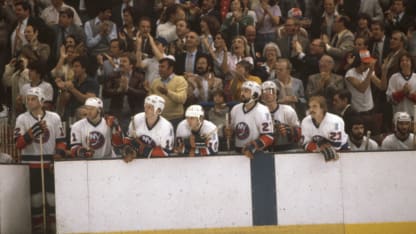
© B Bennett/Getty Images
2. BREAKING A 52-YEAR-OLD RECORD:
If any one characteristic -- other than high-quality play -- characterized the Islanders four-Cup dynasty it was both the club's flair for the dramatic as a whole plus individual players also vying for hockey Oscars.
This never was more evident than on February 20, 1982 at Nassau Veterans Memorial Coliseum. Facing the Colorado Rockies, featuring ex-Islander Glenn (Chico) Resch in goal, the home club had one challenge in mind; win the game and set a new National Hockey League record of 15 consecutive victories
There was no question but that the 15,271 fans who jammed the Big Barn had the same thing in mind.
General Manager Bill (Bowtie) Torrey and coach Al (Radar) Arbour had fashioned a franchise that eventually would be ranked with the most admired hockey clubs in the world. Take any position -- goal, defense or forward -- and the Islanders were sprinkled with future Hall of Famers.
Bill Smith already had established himself as a premier "money" goaltender while defensemen such as Denis Potvin and Ken Morrow already had a shelf full of medals.
The top line featured Bryan Trottier at center between right wing Mike Bossy and left wing Clark Gillies, although John Tonelli frequently replaced Gillies.
Whether Gillies or Tonelli patrolled the port side the line was as good as any trio the opponents could throw at them and were backed by first-rate second and third-liners.
As for the ubiquitous Tonelli, JT could have been dubbed "The Unsung Hero's Unsung Hero."
Already revered as the man who delivered the Cup-winning pass to Bob Nystrom in 1980, the hulking Hamilton, Ontario native had the knack of being in the right place at the right time. This would certainly be true as the Islanders continued through their four-Cup dynasty.
In his autobiography, "Boss: The Mike Bossy Story," The Boss explained how powerful that Nassau team really was at that point in time.
"We finished that (1981-82) season first overall," wrote Bossy. "Plus we had the best power play and one of the best penalty-killing units. We used only twenty skaters and two goalies all season with occasional rookies here and there."
Prior to the potential record-breaker at home, the Nassaumen had to visit Philadelphia for yet another major test. It would be the game that would tie the 1929-30 Boston Bruins 14-game winning streak.
"This was as important to us as a playoff game," Bossy recalled. "We fell behind 4-2 in the second period but I scored and then Brent Sutter got one to make 4-4 after two periods.
"After that, I set up Tonelli for the tying goal. Then Bob Nystrom and JT added empty-netters in the final minute."
Leading into what would be the possible 15th win, the Islanders had mixed emotions. Confidence was based on what they had previously accomplished but there was a fear that their old buddy, Chico Resch, could get in the way.
Sure enough, Resch wanted no part of being the goalie goat for the record and played that way. "Chico was unbelievable," said Bossy. "He tested us and tested us; stopping great scoring chances after great scoring chances."
The score was 2-2 with time winding down in the third period. Bryan Trottier and Brent Sutter had tallied in the first period but then Resch shut the door.
Every Islander -- and fan for that matter -- knew that a tie would not suffice if the Isles were to better the record set by the 1929-30 Bruins.
Revving up the pressure, Arbour & Company tried every trick in their bag of winners to outwit the Colorado defense and then Resch. Yet all seemed to fizzle as the end seemed near. Then, it happened.
Bossy: "With one minute left, Al sent JT, Trots and I over the boards. Trots and JT skated in two-on-two and criss-crossed over the blue line. At the top of the left circle, Trots left the puck for JT who snapped a hard, low shot between Chico's legs."
The red goal light flashed, the record had been broken and the roof nearly was blown off the Coliseum.
"We erupted," added Bossy. "The guys spilled off the bench and mobbed JT, Trots and I who were already celebrating."
Bedlam was the order of the day inside the Coliseum and in every living room where an Islanders rooter was watching the melodramatic ending.
Not surprisingly, the post mortems raised one meaningful question: would Coach Arbour have taken a chance to break the record by pulling goalie Smith for an extra attacker?
"A few of us asked that question," Bossy pointed out. "I remembered that prior to the goal, Smitty had looked over to the bench for instructions."
When Arbour finally was confronted with the question about pulling Smith, he unequivocally shot back, "No way."
Hearing that, Smitty fired back, "We'll never know, will we?"
What we do know is that the streak ended the next night with a 4-3 loss in Pittsburgh but by that time the mountain had been climbed.
Up ahead was another peak -- getting to the Stanley Cup again -- and that was mounted a few months later when the Islanders swept Vancouver in four straight for their third Stanley Cup in a row!
#
3. A STAR IS BORN -- DENIS POTVIN MAKES HIS DEBUT WITH THE ISLES:
In show business, the trick -- especially when stars are born -- is to avoid the build-up to a letdown.
The same feeling pervaded the Islanders in their second season of existence (1973-74) because they now boasted a potential superstar on their roster.
Denis Potvin was a French-Canadian from Vanier, Ontario who was so intensely coveted before even being drafted in June 1973 that Montreal Canadiens GM Sam Pollock offered a whole package of NHL players just for the right to draft Potvin.
Wisely, Islanders GM Bill Torrey said "Thanks -- but no thanks!" to Pollock and then exercised his first pick, Potvin. Now it was up to the young defenseman to prove his worth as the exhibition season began and already there was a letdown.
Coach Al Arbour, also in his first Isles year, confronted Denis at camp. "I'm worried about you," Arbour told his rookie. "You're overweight by at least ten pounds."
Potvin eventually got himself down to proper playing weight and arrested attention with a superior camp prior to the Islanders opening game against the Flames in Atlanta on October 10, 1973. The game ended in a 1-1 tie.
"When the buzzer finally sounded ending the game," Potvin remembered, "I was as tired as I've ever been in my life. Arbour had me on the ice for 40 minutes and I really felt it. In Juniors it was easy; here when I hit someone it hurt -- me."
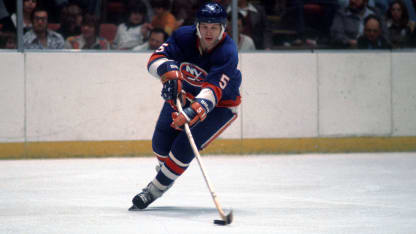
© George Gojkovich/Getty Images
Islanders fans had to wait until October 27, 1973 before Denis made his debut at Nassau Veterans Memorial Coliseum. At age 20, he was facing the Rangers who already were ready to taunt and otherwise confront the Isles freshman.
"I would have been disappointed if the NHL had been too easy on me at the start," Denis noted. "I needed the challenge and felt a new drive inside pushing me. I wanted to keep going up.
"To do that I had to be mean and a few members of the loyal opposition (Rangers) helped bring out the meanness in me."
As it happened, Potvin's first game in Uniondale was against the Blueshirts on October 27, 1973. Arbour's team still was looking for its first win of the young season and Denis did his best to make it a success.
"Before the game our goalie Gerry Desjardins gave me the 'Skinny' on the Rangers goalie Ed Giacomin," Potvin said. "Gerry said that sometimes Giacomin 'pulls up on shots' and I should shoot low. Sure enough, I beat him low on his glove side."
That was only one of two of Denis' goals, the other being on the power play. Altogether the rookie's production energized the 3-2 victory.
It also gave Potvin an enormous burst of confidence; not only for his offense and play behind the blue line but as a presence building a young team.
#
4. TROTS TRAMPLES THE BLUESHIRTS:
By the 1978-79 National Hockey League season, Bryan Trottier had become the template for everything a perfect center should be -- and then some.
His playmaking ability was in the ne plus ultra category.
Bryan's shot seemed to be guided by a hockey GPS tracker.
Playing either in the offensive or defensive zone, he was responsible to a T.
Unlike most forwards his bodychecks had the feel of a human torpedo.
It was on the night of December 23, 1978 at Nassau Veterans Memorial Coliseum that all of the ingredients that would make Trots a Hall of Famer blended to perfection. Sort of a hockey Christmas present two days early.
Competing against the rival Rangers, this native of Val Marie, Saskatchewan executed the almost-unthinkable by scoring more than half his team's totals in a 9-4 Blueshirts beating.
The pre-Yuletide package included five goals -- four red lights and two assists in the second period alone -- and was a portent of things to come since Trots would torment the Seventh Avenue Skaters for years.
"I was in the right place at the right time five times," Trots explained. "My goals actually came about through the hard work of my teammates. Then, the puck came to me each time. Open nets were staring me in the face all night."
His four goals in one period -- the second frame -- set an Islanders record and equaled an NHL record held by five other players. The outburst lifted Bryan's red light total to 35.
Interestingly, once Trottier had posted his fifth goal, teammates tried to set him up for a sixth counter.
"That the guys were trying to get me another one made me feel good," he enthused. "They had chances for shots but slid the puck over my way a couple of times."
His linemates, Mike Bossy and Clark Gillies,each finished the game with four assists, tying the team record while Boss added two goals.
Even the defeated Rangers waxed poetic about Trottier's performance. "Two things impressed me about Trottier," said Ulf Nilsson. "He works so hard and he's a creator. He doesn't wait for things to happen; he makes them happen."
Trottier would finish the season as the NHL's leading scorer for the first time and only time. He totaled 47 goals, 87 assists for 134 points.
Bryan's goaltending victim on his monster night was Wayne Thomas, yanked after two periods. "I try to forget the pain," Thomas concluded.
By contrast, Trots viewed his performance from a different perspective.
"The goals had to be scored. If I had missed, I would have hung myself!"
#
5. THE MARK OF BOSSY
Reviewing the career of Hall of Famer Michael Bossy, it strains credulity to think that 14 teams overlooked him in the 1977 Entry Draft.
"The excuse," Islanders general manager Bill Torrey told me, "was that Michael was weak on defense. In fact, our scouts had some doubts about that as well."
Coach Al Arbour was aware of the supposedly negative critique and had a superb squelch for Torrey. "I'll teach him defense," he promised.
And so he did.
The Montreal native won the Calder Memorial Trophy as the NHL's top freshman in his rookie year of 1977-78. What's more, teamed with center Bryan Trottier and left wing Clark Gillies -- also known as the "Trio Grande" -- Michael took his coach's advice and became as adept at defensive play as he was at lighting the lamp.
One of his motivating elements was his admiration of fellow Montrealer Maurice (The Rocket) Richard, who captained the Canadiens when the Habs won an unprecedented five consecutive Cups from 1956 through 1960.
"Like so many Montrealers," said Bossy, "I knew that the Rocket had scored 50 goals in 50 games during the 1944-45 season and it was something I hoped to accomplish, although it was a tough challenge."
Finally, in the 1980-81 campaign, Mike enjoyed a career year and by January 24, 1981 he had reached the 48-goal plateau entering a game against the Quebec Nordiques at Nassau Veterans Memorial Coliseum.
But with less than five minutes remaining in the 50th game of the season, he had not added to that total. The teams had traded goals all night, notching four apiece until Bossy netted the go-ahead power play goal at 15:50, backhanding a rebound off a Stefan Persson shot.
That was Goal 49 -- with four minutes and ten seconds remaining, could he get another?
Sure enough, with time waning, Bossy received a cross-ice pass from Trottier. Mike sniped it under the stick of goalie Ron Grahame at 18:31. His cries of "I did it!" solidified the accomplishment -- 36 years after the mark was set by The Rocket.
Better still, Richard was on the scene to congratulate the newest member of the exclusive 50-in-50 club.
#
6. ENDING A DROUGHT:
The success and failure of the best hockey dynasties are characterized by ups and downs. For the Islanders it was no different.
Having missed the playoffs since 1994, it wasn't until the new century that the club was able to regain its equilibrium and challenge for a post-season berth.
In 2001-02, the team was bolstered by the addition of snipers such as captain Michael Peca and Russian ace Alexei Yashin, That pair plus adroit goalie Chris Osgood helped turn the team into a viable competitor and for most of the campaign, the Nassaumen looked like they might break the non-playoff skein.
They opened that season with a stunning 9-0-1-1 mark but it took until April 6, 2002 for them to clinch their first playoff berth in seven years in match against the Washington Capitals.
The Visitors from D.C. hit the back of the net first, but Oleg Kvasha and Eric Cairns potted a pair of goals in less than 90 seconds to steal the first-period lead. From there, the Isles scored three straight goals courtesy of Kenny Jonsson, Jason Blake and Peca.
Then, the Caps struck back with three consecutive goals of their own. Preventing more threatening attacks, the Isles won the thriller 5-4.
The victory would catapult them to an overall record of 6-1-0-1 in April before being defeated by Toronto in a seven-game playoff series.
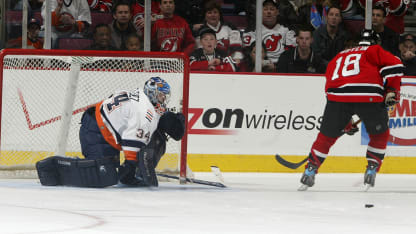
© Andy Marlin/Getty Images
7. PERILOUS PLAYOFF ENTRY: (APRIL 8, 2007):
Inevitably the homestretch of any NHL season overflows with heart-throbbing games. For the Islanders, the 2006-07 campaign ranked among THE most exciting in the club's long history.
As it happened, in this particular year, the Nassaumen held their playoff destiny on their own sticks. And it all hinged on a game against the New Jersey Devils at the Continental Airlines Arena on the final night of a pulsating season.
All the Islanders needed to move into the post-season and beat out the Toronto Maple Leafs for the eighth seed, was a victory. For a time, it appeared the two points were well-ensconced in the Islanders bag for coach Ted Nolan's sextet.
A 2-0 lead eventually evaporated to a 2-1 squeaker yet the pesky home club persisted. As the clock ticked down to the final seconds of the third period, New Jersey center John Madden swept the loose puck behind Wade (Dubie-Dubie-Dubie) Dubielewicz forcing overtime.
Not surprisingly the Meadowlands crowd was tickled as New Jersey skaters suddenly had the momentum going for them, especially goalie Scott Clemmensen on the home side.
Alas, this was the first Shootout to determine a playoff berth. Now it was hero time and both Miro Satan and huge Viktor Kozlov beat Clemmer.
Zach Parise got one for the Devs but it all came down to Sergei Brylin vs. Dubie.
Just as Brylin was about to try a deke on Dubie, the crafty Islanders puck-stopper stunned Sergie -- not to mention the crowd -- with a deft thrust of his stick -- otherwise known as a poke check -- that pulled the Islanders into the playoffs.
"We were just talking about what we were thinking before we (he and Kozlov) shot," said Satan, "and how we were handling the pressure of a Shootout for the playoffs.
"To have overtime and then a Shootout for the playoffs after playing 82 games in a season, it's unbelievable. But we pulled through it and that made it even more exciting!"
#
8. A Sure-Fire Shootout (October 19, 2005):
In Islanders history there are "firsts" all over the place. But one of my favorites has to do with the "First Shootout In Islanders History."
Interestingly, the foe just happened to be the Fellows From Manhattan; alias the Rangers. Guess what? It was also the first shootout in Blueshirts annals. So there!
The game took place before a capacity crowd at Madison Square Garden. The chief protagonists were, Rick DiPietro in goal for the Isles, while Henrik Lundqvist manned the opposite crease.
Blowing a 2-0 lead in the final period, the visitors were confronted with a need to regain momentum for the overtime period, especially since Petr Prucha had knotted the count late in the third on a power-play.
During the back and forth overtime, both goaltenders excelled, sending the match to the shootout realm. This, of course, arrested the crowd's attention since nobody really knew what to expect out of what some called "A Skills Competition."
Nonetheless the atmosphere was electric as DiPietro -- in the following order, foiled -- Prucha, Jaromir Jagr and Michael Nylander.
Alexei Yashin, who opened for the Islanders, was stopped by Lundqvist. But the second man up, Miroslav Satan, tried a traditional wrist shot on Henrik and beat him cleanly. Mark Parrish was stopped but it no longer mattered.
FINAL SCORE: ISLANDERS 3, RANGERS 2 (SO)
Not only did DiPietro star in goal but as a postscript he also offered his services as a hockey critic. Here's how he opined about the first shootout:
"I don't know if the league expected it to be this fast and upbeat. I don't know if it was just this series -- how pumped up the guys were -- but every game you see now is 35 shots and 10 power plays.
"It's a whole new game and I hope the fans are enjoying it!"
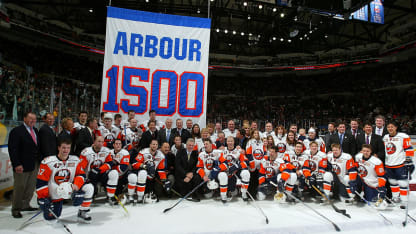
© Jim McIsaac/Getty Images
9. Radar Returns for 1500 (November 3, 2007):
Numbers aside, Al (Radar) Arbour arguably can go down as the best coach in NHL history. His four Stanley Cups and Hall of Fame induction aside, one of the most significant dates in his history is November 3, 2007. It was then that Al sought his 740th victory in what was his 1,500th contest. But -- here's the hitch -- Radar had to come out of retirement to attain the pair of historic marks.
To facilitate the feat, then coach Ted Nolan graciously turned the coaching reins over to Arbour, then 75, in this attempt to rewrite history. A day before the memorable Saturday night, Al came to the Coliseum and signed a one-game contract with the Islanders. By actual game time, fans were in a tizzy and so were the Islanders who wore their traditional white jerseys as tribute to the championship teams of Al's past. And when the teams took the ice -- Pittsburgh was the foe -- Arbour was greeted with a standing ovation.
The game itself started poorly as the Penguins grabbed a 2-0 lead, beating Rick DiPietro and looking invincible while they were at it. But the counterattack would come, and was launched by Trent Hunter who beat Marc-Andre Fleury to make it a 2-1 game. Slowly, the Arbour magic took hold and in the third frame Miroslav Satan tied the count at 5:30. For a time it appeared that the score would remain that way but -- as in Al's days of yore -- Satan beat Fleury again with 2:41 left and the Isles triumphed, 3-2, for Radar's 740th career W.
Adding icing on the cake -- and on the ice --a post-game ceremony featured two new banners hoisted to the Coliseum rafters -- one for Arbor's 1,500th game and the other for his 740 wins. Both justice and drama triumphed for the legendary coach of the Nassaumen!
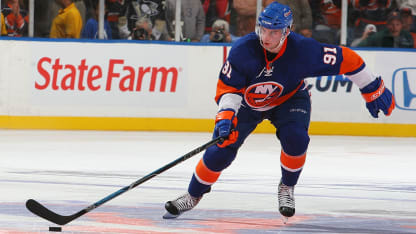
© Mike Stobe/Getty Images
10. The Tavares Era Begins (October 3, 2009):
Few players have drawn more attention to their evolution as a future star than John Tavares; and I was there in Montreal when the New York Islanders selected him first overall in the 2009 NHL Draft.
Naturally, the spotlight would follow the Isles center from that moment on October 3, 2009 when he made his debut in John's first regularly scheduled game.
Skating against the Pittsburgh Penguins, Tavares scored his first career goal on the power play at 12:51 of the second period. He beat Marc-Andre Fleury on the blocker side with a backhand. Putting cherry on the cake, Tavares also added an assist on Mark Streit's goal at 12:40 of the first period -- also on the power play.
"It was awesome," Tavares told Newsday postgame. "For it to come in my first game against that team, in front of my family, it was special for a lot of reasons."
Tavares was the 18th Islander, and first since Jessie Joensuu to score in his NHL debut, who did it in 2008. The ovation John received from the Coliseum audience was a portent of mighty things to come.
The 19 year-old finished his rookie campaign with 24 goals and 30 assists for a total of 54 points. JT also finished with 11 power-play goals and two game-winning goals.

